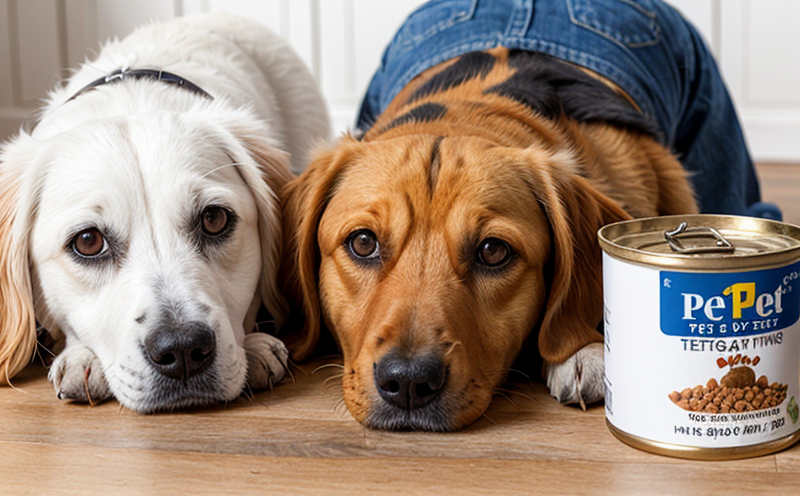ISO 95203 Amylase Residue Profiling in Pet Food
The ISO 95203 standard provides a comprehensive methodology for the quantification of amylase residues in pet food. This service is particularly valuable for quality managers, compliance officers, R&D engineers, and procurement teams within the pet food industry. By ensuring accurate measurement of amylase residue, this test helps manufacturers maintain product integrity and comply with regulatory standards.
The process involves several critical steps to ensure reliable results. Specimen preparation typically includes thorough mixing of sample batches according to standard procedures defined in ISO 95203. The chosen method for analysis is chromatography coupled with mass spectrometry (LC-MS/MS), which offers high sensitivity and specificity required for this type of residue profiling.
Understanding the significance of amylase residues in pet food requires a brief overview of their role within the product matrix. Amylases are enzymes that break down starch into simpler sugars, providing energy sources essential for pets' digestive systems. Ensuring proper levels ensures nutritional adequacy without causing adverse effects such as gastrointestinal discomfort or metabolic imbalances.
The ISO 95203 method measures amylase residues based on their molecular weight and chemical structure, allowing manufacturers to differentiate between naturally occurring and added enzymes. This differentiation is crucial for several reasons:
- To verify the authenticity of labeled claims regarding enzyme content in pet food products.
- To prevent potential contamination from unauthorized sources.
- To ensure compliance with labeling regulations set by organizations like the FDA or other relevant authorities worldwide.
The test results are reported according to ISO 95203 guidelines, providing detailed information about detected amylase residues including their concentrations and types. Reporting not only aids in quality control but also supports regulatory compliance efforts by ensuring that pet food meets specified nutritional requirements without exceeding allowable limits for added ingredients.
| Sample Preparation | Analytical Methodology | Reported Parameters |
|---|---|---|
| Mixing samples thoroughly as per ISO 95203 instructions | Liquid Chromatography-Mass Spectrometry (LC-MS/MS) | Concentrations and types of amylase residues detected |
This detailed approach ensures that pet food manufacturers can confidently produce products that meet both regulatory requirements and consumer expectations. The accuracy provided by ISO 95203 amylase residue profiling is essential for maintaining brand reputation, ensuring product safety, and fostering trust among consumers.
Applied Standards
The primary standard used in this service is ISO 95203:2018 which specifies the procedure for quantification of amylase residues in pet food. Compliance with these international standards ensures consistency and reliability across different laboratories performing similar tests.
The standard outlines specific procedures for sample preparation, analytical techniques, calibration curves, and quality control measures to ensure accurate measurement results. Adherence to ISO 95203 helps labs maintain high standards of proficiency while providing consistent data that can be compared internationally.
Why Choose This Test
Selecting the appropriate quality assurance measure is crucial for maintaining product integrity and ensuring compliance with regulatory guidelines. The ISO 95203 amylase residue profiling test offers several advantages:
- Precision: LC-MS/MS technology provides extremely precise measurements of even minute amounts of amylase residues.
- Regulatory Compliance: Ensures that pet food products meet all necessary regulatory requirements, reducing the risk of legal issues or recalls.
- Consumer Trust: By ensuring accurate labeling and safe ingredient sourcing, this test builds confidence among consumers regarding product quality and safety.
- Competitive Advantage: Demonstrating adherence to rigorous standards can set a company apart from competitors in the pet food market.
The ability to detect even trace amounts of amylase residues makes this service invaluable for R&D teams looking to optimize formulations or troubleshoot issues related to enzyme performance. For procurement departments, it ensures that raw materials used in production meet stringent quality criteria before they are incorporated into final products.
Furthermore, regular testing using ISO 95203 helps companies stay ahead of emerging trends and consumer preferences by continuously refining product offerings based on scientific evidence rather than speculation or outdated practices.
Use Cases and Application Examples
- Ingredient Verification: Ensuring that only authorized enzymes are present in pet food products as labeled.
- Quality Control: Monitoring changes in enzyme activity over time to maintain consistent product quality.
- New Product Development: Evaluating new formulations for their suitability and effectiveness regarding enzyme content.
- Supply Chain Audits: Verifying supplier compliance with agreed-upon specifications concerning enzyme usage.
In addition to these direct applications, ISO 95203 amylase residue profiling also serves as part of a broader suite of tests aimed at comprehensive pet food quality assurance programs. It complements other analyses focused on nutrient composition, microbial safety, and allergen detection by offering insight into enzyme contributions specifically.





